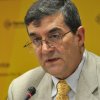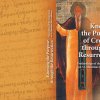He was director of the Center for International Affairs at the Rockford Instituteuntil his resignation on December 31, 2008. Trifković was also an unofficial spokesman for the Republika Srpska government in the 1990s and a former adviser to Serbian president Vojislav Koštunica and Republika Srpska president Biljana Plavšić.
Trifković is the author of Sword of the Prophet, a book on the history and doctrines of Islam. He comments on Balkan politics and is a regular columnist for several conservative publications in the United States.
Trifković earned a BA (Hon) in International Relations from the University of Sussex in 1977 and another, in Political Science, from the University of Zagreb in 1987. Since 1990 he has held a Ph.D in modern history from the University of Southampton, and in 1991-1992 he pursued post-doctoral research on a Title VIII grant from the U.S. Department of State as a Visiting Scholar at the Hoover Institution in California.
Beginning in 1980, he has been a radio broadcaster for BBC World Service and Voice of America and later a correspondent covering southeast Europe for U.S. News & World Report and the Washington Times during which time he was an editor for the Belgrade magazine Duga. In 1994–95 he acted as an "unofficial spokesman" for the Bosnian Serb government (while preferring to describe himself as a "Balkan affairs analyst with close links to the Bosnian Serbs"). He has published op-eds and commentaries in The Timesof London, the San Francisco Chronicle, the American Conservative, the Philadelphia Inquirer, and Alternative Right. He has also been a commentator on numerous national and international TV and radio programs, including the Oliver North Show on (MSNBC), CNN, CNN International, SKY News, BBC Radio 4, BBC World Service and CBC. He has contributed to Liberty, the newspaper of the Serbian National Defense Council of America.
He has been an adjunct professor at the University of St Thomas in Houston, Texas (1996–1997), and in August 1997 he joined the faculty of the short-lived Rose Hill College inAiken, South Carolina. He has worked as a political consultant to Aleksandar Karađorđević, Crown Prince of Serbia, and to Former Yugoslav President Vojislav Koštunica, as an adviser to Biljana Plavšić and as representative of the Republika Srpska in London.
In February 2000, he testified to the Canadian House of Commons on the situation in the Balkans. In July 2000 he took part in a Congressional briefing organized by Rep. Dennis Kucinich.
In January 2003, he was criticized by Stephen Schwartz and accused of being a Islamophobe, associated with Pravda and Antiwar.com, and "the main public advocate in the West for the regime of Slobodan Milošević." Trifković later received a formal apology from the publisher of Schwartz's article.
In March 2003, he testified as a defense witness for Milomir Stakić at his trial before the International Criminal Tribunal for the Former Yugoslavia. Stakić was later convicted of extermination, murder and persecutions and sentenced to 40 years’ imprisonment.
In June 2006, he was one of twenty four people who presented works at a symposium on the Holocaust in Yugoslavia, 1941–1945, co-organized by two Serbian institutions and held at Yad Vashem Center in Jerusalem.
In September 2008, he testified as a defense witness for Ljubiša Beara in the Popović et el. trial. Beara was later convicted of genocide, extermination, murder, persecutions and sentenced to life imprisonment.
In August 2011, it was reported that Trifković's works were an inspiration for Norwegian terrorist Anders Behring Breivik who cited him in his A European Declaration of Independence manifesto. Trifković denied these claims.
Trifković is the author of Sword of the Prophet: The Politically Incorrect Guide to Islam, a book about the history and tenets of Islam which identifies the rise of Islamic fundamentalism as the greatest danger to Western values since the end of the Cold War. According to James Bissett, former Canadian Ambassador to Yugoslavia and a close associate of Trifković, Trifković sees the source of this threat in the absence of separation of church and state under Islam - because Islam is a way of life, Muslims are required to subordinate themselves to the teachings of Allah and live as members of the total Islamic community, calling into question their ability to give their political loyalty to a non-Muslim state. Trifković considers this to be a particularly important issue for the countries of Western Europe, with a population of over 50 million Muslims, and the United States (approx. 9 million).
In February 2011, Canadian authorities refused to allow Srđa Trifković to enter Canada to address a meeting at the University of British Columbia at Vancouver.
Trifković reported in the journal Chronicles that he was refused entry to Canada on 24 February 2011 on the "transparently spurious" grounds that he was "inadmissible on grounds of violating human or international rights for being a proscribed senior official in the service of a government that, in the opinion of the minister, engages or has engaged in terrorism, systematic or gross human rights violations, or genocide, a war crime or a crime against humanity within the meaning of subsections 6 (3) to (5) of the Crimes Against Humanity and War Crimes Act."
He believed that his "inadmissibility" was due to contacts with the Bosnian Serb leaders in the early nineties but claimed that the Canadian authorities' grounds for refusing him admission were "transparently spurious" and they had in fact yielded to a Bosniak-inspired campaign against him. The Canadian Institute for the Research of Genocide had complained that Trifković was promoting hatred, antisemitism and islamophobia and accused him of publicly denying what New American termed the "alleged" massacre of Bosniaks at Srebrenica in July 1995, found by the International Criminal Tribunal for the former Yugoslavia to be a crime of genocide.
The John Birch Society's New American Magazine attributed the decision to refuse Trifković entry to his criticism of Islam and "jihadists", his argument that American policymakers should treat Islam as a hostile political ideology instead of as a religion, and his call to halt Muslim immigration to the West.
New American cited Trifković's views as an author of books on Islam: "[W]e need an absolute moratorium on the immigration of Muslims into both Western Europe and North America, coupled with the denial of citizenship to all practicing Muslims, the denial of security clearances, and the policy of systematic deportation of all jihadists(sic) activists. ... Islam ought to be regarded as a violent political ideology rather than just a religious cult."
Trifković's controversial views concerning the Jewish intellectual tradition were deplored by Robert Spencer, a fellow critic of Islam who argued that Trifković should not have been denied admission to Canada "for politically incorrect opinions".
Works
- "Rivalry between Germany and Italy in Croatia, 1942-1943". The Historical Journal (Cambridge University Press) 36 (4): 879–904. December 1993.
- Ustasa: Croatian separatism and European politics, 1929-1945, London (1998) ISBN 1-892478-00-5
- The Sword of the Prophet: The politically incorrect guide to Islam: History, Theology, Impact on the World, Boston, Regina Orthodox Press (2002) ISBN 1-928653-11-1
- Defeating Jihad: How the War on Terrorism May Yet Be Won, In Spite of Ourselves, Regina Orthodox Press (2006).
- The Krajina Chronicle: A History of Serbs in Croatia, Slavonia and Dalmatia, The Lord Byron Foundation, (2010).
The Sword of the Prophet received praise from critics. It was described as an "exceptionally fluid argument against militant Islam... Powerful stuff powerfully presented" by Ray Olson in Booklist.
From Wikipedia





